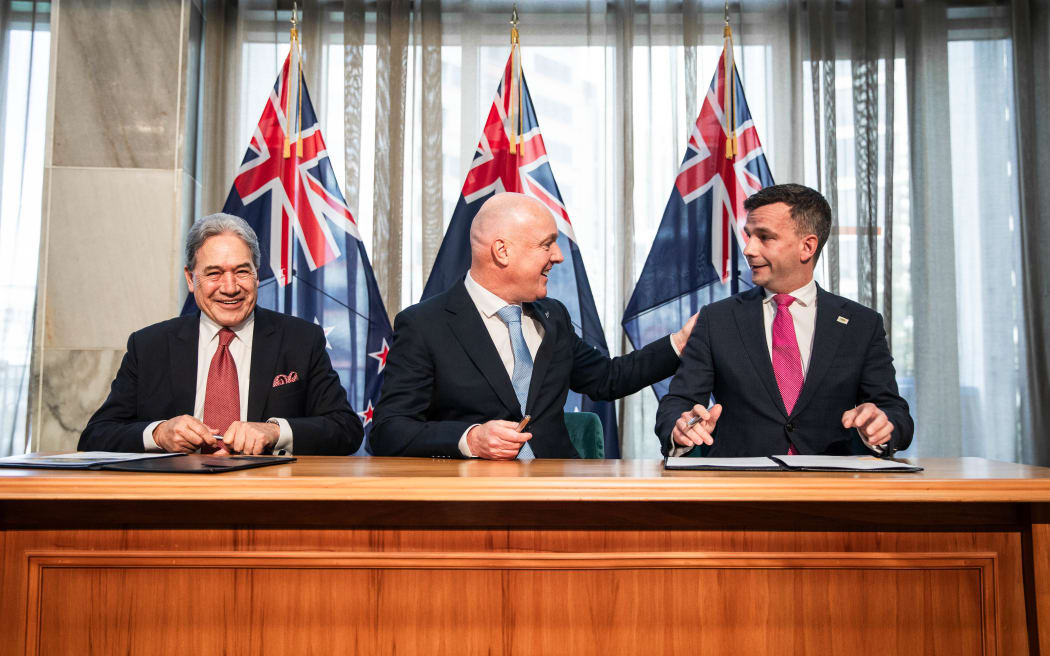Supporters say it will cut through red tape and get big infrastructure projects off the ground, but critics say the new fast-track legislation is nuclear war on the environment

Winston Peters, Christopher Luxon and David Seymour at the formal signing ceremony. Photo: RNZ / Samuel Rillstone
When it comes to talking about the government's controversial fast-track consenting process, political scientist Richard Shaw refers to the famous Chinese sci-fi novel Three Body Problem, while RNZ's In Depth journalist Farah Hancock talks about zombie projects.
Shaw is referring to the three-party coalition government and how the proposed legislation is unprecedented in the power it gives to three ministers in charge, including minor coalition partner, NZ First's Shane Jones.
"The Three Body Problem is where you have three bodies trying to orbit each other and can never be stable, they are always chaotic and they are always unpredictable," says Shaw, professor of politics at Massey University.
Hancock's "zombie" projects are those that have been rejected by courts, but may now be dredged up again under fast-track, meaning politicians will have power over the courts.
"There's worry that some of these projects which people have fought for years and years and years and thought they'd won could come back from the dead," she says.
But developers and infrastructure industry players say the system is broken and more efficient legislation will help fix it without adverse impact to the environment.
The legislation is at the select committee stage after submissions closed on April 19. If it goes through in its current form, the three ministers - Jones, Simeon Brown and Chris Bishop - will have absolute final say on some big projects.
The new law would sit over a range of existing acts and regulations and would mean an application would need to go through one process for approval on a project instead potentially several consents under the existing system.
Project owners would apply to the three ministers for access to the fast-track process. The project would then go to an expert panel which will vet the project and make a recommendation to the ministers, who would then decide whether to approve or decline it.
Bishop, the RMA minister, calls it a one stop shop that will cut the red tape that can hold up the progress of projects by years. Jones, the Resources Minister repeatedly uses the phrase, "we're moving from cancelling economics to can-do economics".
They argue that it builds on existing Covid-19 legislation from the previous Labour government and that the three ministers' executive power is the "safeguard".
"It's a safeguard for the applicants but it is not necessarily a safeguard for the environment or the public," says Hancock.
Critics also say it will put profit ahead the environment and shut out conservation groups such as Forest and Bird and the Environmental Defence Society from going beyond the submission process.
"They can't make submissions on individual projects," says Hancock. "And we don't know what those projects are yet, they haven't been announced but the public and NGOs are shut out of that process and that's a big concern for them."
An application would go through an expert panel that would have to put the purpose of the Fast-Track Act, which is to get the project off the ground, above everything else, she says.
Bishop says whether the ministers offer a safeguard or have too much power can be debated at the select committee process.
Richard Shaw argues that ministers are professional politicians but they are amateurs when it comes to their portfolios and they need the expert advice and guidance of officials.
"We have really powerful governments in this country so we need to have other ways of holding them to account and to ensuring that decision-making is transparent and I think some of those norms and conventions are not met by this particular piece of legislation."
Check out how to listen to and follow The Detail here.
You can also stay up-to-date by liking us on Facebook or following us on Twitter.

